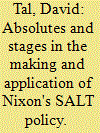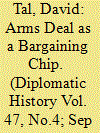| Srl | Item |
| 1 |
ID:
126736


|
|
|
|
|
| Publication |
2013.
|
| Summary/Abstract |
President Richard Nixon and his National Security Adviser, Henry Kissinger took great pride in their success to achieve agreements on the limitation of Anti Ballistic Missiles and the Interim Agreement on Strategic Missiles with the Soviet Union. For Nixon, this agreement was not only an achievement that had been denied to his predecessor, it also seemingly represented the success of his own approach over that of his predecessors. Nixon-in tandem with Kissinger-intended to link arms control negotiations with the Soviet Union to the resolution of other political problems such as Vietnam, the Mideast, and Berlin. Through the employment of linkage, they hoped to make U.S. arms control policy part of Détente. However, Nixon was able to sign the "historic agreements" because his policy of linkage had in fact failed. It failed mainly because it was based on flawed assumptions and false premises. Thus, the historic success was possible precisely because Nixon had not actually made his arms control policy "distinct" from that of the Johnson Administration and its predecessors in his approach to strategic arms talks with the Soviet Union
|
|
|
|
|
|
|
|
|
|
|
|
|
|
|
|
| 2 |
ID:
193508


|
|
|
|
|
| Summary/Abstract |
It was a fierce battle between the executive and the legislature, which it appeared that U.S. President Ronald Reagan would lose. The battle raged for months, during which both the majority of the House of Representatives and Senate voted against the President’s bill. However, as the final and decisive vote in the Senate plenum came closer, the President mastered all of his political skills and power of conviction and managed to persuade eight senators to change their minds. After the votes were counted, it turned out that fifty-two senators voted in favor of the President’s bill for the supply of the surveillance and command center planes known as the Airborne Warning and Control System—AWACS—to Saudi Arabia and forty-eight senators voted against it.1 Discussing the President’s success, scholars have raised several issues that came out of the affair. One issue was the battle between Reagan and the Jewish lobby over the right to act on what he deemed as a national security matter. Another issue was the right of the legislative branch to take an active role in the making of U.S. foreign policy, a domain the President considered as his purview. Scholars have given special attention to the President’s political skills, and the way he managed to convince senators to swing and support the bill.
|
|
|
|
|
|
|
|
|
|
|
|
|
|
|
|
| 3 |
ID:
145801


|
|
|
|
|
| Summary/Abstract |
Scholars and pundits believe that Anwar Sadat went to war in October 1973 because Israel left him no choice. The Israeli government rejected his peace proposals during 1971–73, and Sadat initiated the war in order to demonstrate his refusal to agree to the status quo and to the continuation of the Israeli occupation of the territories it occupied in June 1967. However, when the peace treaty signed between Israel and Egypt in March 1979 is carefully studied, it appears the terms of the treaty were in fact much closer to the Israeli position and terms as presented before the 1973 war than to those set by Sadat. Careful reading of the relevant documents in general and Sadat's claims and arguments in particular will show that it was actually Sadat who needed the war, and he needed it not in order to force Israel into a political process, but for himself, so as to accept terms he could not accept without a war.
|
|
|
|
|
|
|
|
|
|
|
|
|
|
|
|